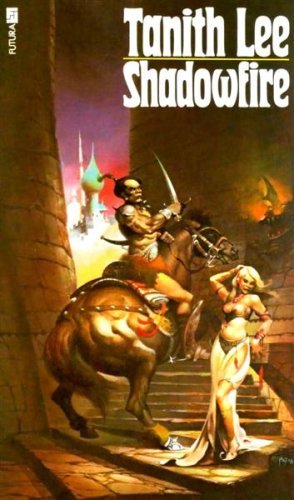This is the second in the Birthgrave trilogy and takes a different approach than the first volume, also lacking the science fantasy elements that figured largely in the conclusion of that volume. As with book 1, the writing has the powerful language and imagery typical of Tanith Lee, and the strange cultures are well realised. It is much shorter and more focused than the first volume, being one man's journey of self discovery. It revolves around his relationship to three women: his mother, his captive-wife Demizdor from the cities, and a healer/witch woman of the sea community who attempts to use him to make someone else jealous.
The story is told in the first person viewpoint of Tuvek, a warrior in the making, but readers of volume one will realise he is the child left behind by the nameless protagonist of book 1 when she escaped the brutal tribal community in which she was enslaved. Tuvek is an outsider, partly because his (adoptive) mother is an out-tribe woman, taken on a raid by his supposed father, the leader of the tribe. The antipathy between himself and his 'father' is mutual, worsening to outright hatred on the part of his 'father' when Tuvek proves himself an exceptional warrior. Tuvek has more regard for the woman he thinks is his mother than do most of his contemporaries for their mothers, but ultimately he takes her for granted and only realises what he has lost when it is too late. This is a repeating pattern, as he later makes the same mistake with another key woman in the book, Demizdor.
Tuvek learns of his real nature when the degenerated remnants of city folk - reduced to a tawdry and declining splendour after the war triggered by a man called Vazkor - attack and capture many tribesmen to use as slaves. Only he has the courage to track them and free their captives, at which point he discovers not only that he understands their language instinctively, but also that he strongly resembles Vazkor whom they once revered and now hate. So begins his identification with the spirit of his real father, Vazkor, whom he learns was 'betrayed' and 'murdered' by his real mother - although we know from book 1 that the situation was far from being so simple. Late in the book, he encounters a seaside community established by one of the bodyguards who became his mother's last set of protectors. Their chief explains his mother's kindness and how she saved his life, but Tuvek clings to his 'knowledge' of her rejection of him and treachery to his father.
The women in the story apart from the third one are ambivalent characters because his mother relies on him to protect her within the tribe where she is the outsider and is crushed when he grows up and involves himself with other women, and Demizdor, although supposedly an independent woman who can ride horses and enjoy culture - very different from the trodden down semi-slaves of his people - ultimately defines herself by her relationship with him, to her ultimate destruction. Tuvek is changed by his encounters: he becomes more gentle by the time he meets the third woman, but is still stubbornly set on hero worship of a father he knows very little about and automatically assumes to be right since women are inferior and wrong. Despite his greater solicitude for his mother, he absorbed the attitudes in his tribe, seeing nothing wrong with rape and killing, starting both around age fourteen, so he doesn't come over as a very attractive character. His vow at the end of this volume bodes ill for the well-being of his true mother.


